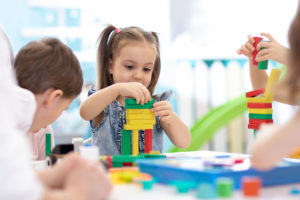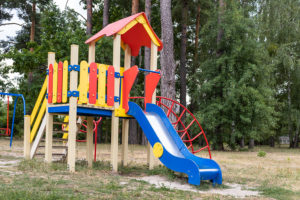 The parents of a 10-month-old girl recently filed a lawsuit against a daycare center in Overbrook Park after a portion of the little girl’s finger was severed while she was at the facility. The child was taken by ambulance to the hospital, where doctors planned to monitor the wound, with the possibility of reconstruction surgery needed in the future. The mother stated that she simply wants to know what happened to her daughter while she was in the center’s care. The family’s attorney stated that he hopes the lawsuit improves the daycare’s procedures so that no other children are injured there, stating that the injury was preventable.
The parents of a 10-month-old girl recently filed a lawsuit against a daycare center in Overbrook Park after a portion of the little girl’s finger was severed while she was at the facility. The child was taken by ambulance to the hospital, where doctors planned to monitor the wound, with the possibility of reconstruction surgery needed in the future. The mother stated that she simply wants to know what happened to her daughter while she was in the center’s care. The family’s attorney stated that he hopes the lawsuit improves the daycare’s procedures so that no other children are injured there, stating that the injury was preventable.
Each day, throughout Philadelphia, parents entrust the most important part of their lives, their children, to daycare providers. What happens when a child is injured at a daycare center due to a lack of supervision, neglect, or even child abuse? Are daycare centers investigated? Can parents recover money to pay for the medical expenses incurred? Let’s take a look at these issues.
Common Injuries Sustained at Daycare Centers
Childhood injuries are a relatively common phenomenon in any setting. In fact, unintentional injuries are the leading cause of death for U.S. children, according to the Centers for Disease Control and Prevention (CDC). Approximately 9.2 million children visit the emergency department each year due to injury, with falls being the leading cause of non-fatal injury. Injuries are most commonly experienced by children aged two to five years old. Daycare centers feature many potential hazards not necessarily found in the family’s home. With those hazards come a few injuries common to that specific setting, including:
- Playground injuries and injuries related to outdoor playtime. These injuries can arise due to unsafe or poorly maintained playground apparatus, trees, or large rocks that can cause a child to slip and fall, or even a hard landing falling from playground equipment. Playgrounds are the most frequent setting for falls resulting in injuries at a daycare center.
- Falling objects. The natural curiosity of small children is to reach for objects that catch their interest. Thousands of children undergo medical treatment each year for injuries sustained by heavy objects falling or being pulled off of high shelves. Many times, the daycare provider is not supervising the child properly or heavy items have been improperly stored at heights that cause them to become a hazard.
- Interaction with another child. Bites, slaps, being pushed down: these activities can take place in crowded daycare centers and can result in injuries that require medical attention.
- Poisoning. Much care must be taken by daycare providers to ensure that cleaning products and other chemicals are kept in a locked area that is not accessible to the children. Many children are taken to hospital emergency rooms due to accidental poisoning and exposure to toxic chemicals.
- Transportation injuries. Motor vehicle accidents are the most common source of unintentional death in children.
- Choking. Daycare center staff must be trained on the age appropriateness of snacks, such as peanuts, popcorn, raw vegetables, grapes, hot dogs, and other small food items that could cause a small child to choke.
- Lack of appropriate smoke detector equipment and fire drills with the children so that they understand concepts such as stop, drop, and roll in the event of a fire. It was discovered in August 2019 that a home daycare center in Erie, PA, where children stayed through the nighttime hours, did not have the legally required amount of smoke detectors for all floors of the home. Five children, ranging in age from 9 months to 8 years, died in the blaze, including the children of a volunteer firefighter who was out responding to another call in the early morning hours when the daycare center burned. Officials suspected that the accidental fire was sparked by an electrical source. All of the children died of carbon monoxide poisoning and smoke inhalation.
- Drowning. Items that may pose a drowning risk in childcare centers include swimming pools, bathtubs, buckets, and other containers filled with water.
How Common Is Abuse at Daycare Centers?

Pennsylvania law defines daycare abuse as an act that causes non-accidental serious physical injury, sexual abuse or sexual exploitation, serious physical neglect (including prolonged or repeated lack of supervision), or failure to provide the children attending the center with the essentials of life.
According to the Pennsylvania Department of Human Services’ 2018 Child Protective Services Report, 2,338 reports of suspected abuse took place at child care settings around the state in one year. Child care settings include child care homes, child care centers, foster homes, boarding homes for children, juvenile detention centers, residential facilities, and institutional facilities. Of those reports:
- There were 183 substantiated reports.
- 939 reports were referred to law enforcement for possible criminal investigation.
- Of the reports referred to law enforcement, 148 were substantiated by the county agency or the Office of Children Youth and Family Services.
The totals above do not include private babysitters employed by the child’s parents. The number of substantiated reports of abuse involving a babysitter who was the perpetrator in 2018 was 156.
What Are the Signs of Daycare Abuse?
As explained above, daycare abuse may include serious physical injury, but it doesn’t always. Many of the wounds caused by abuse are emotional. If your child is exhibiting the following signs, you may have reason to suspect that abuse is taking place.
- Unexplained bruises, cuts, or injuries
- A sudden and intense aversion to attending the daycare center
- Clingy behavior
- Discomfort with being undressed or allowing assistance with toileting
- Attempting to engage in play with other children that is not age-appropriate
- Extreme changes in behavior and mood swings
- Aggressive behavior, including biting or kicking
- Inappropriate sexual behaviors or expressed interest and knowledge in topics pertaining to sex
- Reverting to behavior normally exhibited by a much younger child
- Urinary tract infections, soreness, or bleeding in the genitals
- Recurring nightmares
If the Injury Wasn’t the Result of Abuse, Do I Still Have a Case?
The determination of whether you have a legal claim to compensation due to the injuries your child sustained at a daycare center is something you and your personal injury attorney will discuss during your initial consultation and is dependent on the facts of how the injury occurred. That said, daycare centers in Pennsylvania are required to be licensed by the state, are subject to inspection, and are heavily regulated. A violation of state regulations or the own daycare center’s policy could give rise to liability for the center and its employees. Some of the regulations that the center is required to follow include:
- A collection of the child’s health history, including information about any special needs the child may have.
- A written record of all injuries sustained while in care and attempts to contact the parent or other emergency contact made if the child should require emergency medical treatment.
- Thorough background checks of all staff and volunteers who will be working with your child, as well as required training and regulations pertaining to the staff to child ratio at the facility.
- Requirements regarding the safe storage and administration of a child’s medication.
- Requirements regarding the provision of nutritious meals and snacks and the provision of a weekly menu for family.
- Written consent by the child’s parent or guardian for daycare center staff to transport the child in a motor vehicle and regulations as to how many children can be transported in the vehicle as well as how many staff are required to accompany the number of children being transported.
- Requirements regarding safe space for indoor and outdoor play, including regulations regarding the safety of play surfaces.
Some of the factors that may constitute negligence in a daycare center include:
- Lack of supervision at the facility
- Leaving a child unattended in a car
- Failure to secure medications and toxic chemicals in an area that is inaccessible to children
- Failure to collect the child’s health history
- Failure to use safety restraints with children in vehicles that are not exempt from child restraint laws
- Failure to do a complete background check on staff and volunteers who are working with the children
- Neglecting visible signs of injury or illness and failing to provide a written record of how the injury took place
My Child’s Daycare Center Made Me Sign a Waiver
Many daycare center directors or operators believe that they can require parents of newly enrolled attendees to sign a waiver releasing the center of any liability if an injury should result from accidental or intentional actions by the daycare center staff. However, this is not the case.
Because daycare centers are in the business of providing care to and supervision of children and are a state-regulated industry, these waivers may not hold up in court. If your child was injured because of negligence or abuse, not only will state inspectors from the Department of Children and Families investigate reported allegations, but you will still be entitled to seek compensation for expenses and life impacts incurred due to the injury.
Who Is At Fault for My Child’s Injury?

If your child was injured at a daycare facility, it may not always be immediately apparent whose actions led to the injury taking place. In daycare injury lawsuits, there is often more than one defendant, because many people and entities have a responsibility toward your child in daycare. Some potentially liable parties include:
- Staff members responsible for supervising your child and for reporting suspected abuse
- The daycare center operator, who is responsible for following state regulations, following center policies and protocols, reporting abuse, hiring and training staff, conducting background checks on staff, contacting parents in emergencies, providing written reports of all accidents and injuries sustained by your child while in its care, and ensuring that the facility is safe of hazards that could injure your child.
- Those responsible for transporting your child
- Volunteers and visitors at the center
Your Next Steps
The suspicion that your child may have been abused at a daycare center is terrifying for parents and may cause feelings of guilt or disbelief. If you suspect that your child’s injuries were abuse-related or a result of dangerous conditions at a daycare facility, here are some tips as to what to do next:
- Trust your gut. You know your child better than anyone, and if you notice that something seems amiss with your child, you’re probably right. Seek help from a doctor and report your suspicions with the Department of Children and Families.
- Document any injuries or changes to your child’s behavior. Take detailed notes, including any information that your child can provide. Photos of injuries are important evidence that should be taken and preserved.
- Retain all copies of medical bills related to injuries your child sustained at the daycare center, as seeking compensation will require documentation of injury-related expenses.
- Bear in mind that abuse or neglect situations are rarely isolated. There may be other children at the daycare facility who are also at risk. If the opportunity arises, speak to other parents to see if they have noticed anything about the facility, the staff, or their own child’s behavior that has made them feel uneasy. Reading law enforcement officials, for example, charged a daycare teacher in a second case involving inappropriately touching children. The man was initially arrested and charged with inappropriately touching a four-year-old boy in his care. He was charged with indecent assault, corruption of a minor, and endangering the welfare of a child. After his arrest, a five-year-old boy told his parents that the teacher had also inappropriately touched him. The man has now been charged with institutional sexual assault, aggravated indecent assault on a child under 13 years of age, and other offenses related to the second case.
- Contact an attorney experienced in daycare injury cases who can provide legal information and guidance to help you make informed decisions as to your legal options.